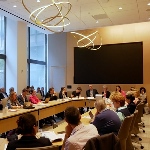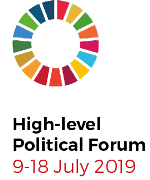Published on Wed, 2019-07-17 10:37
“There needs to be an examination of the hardware of the 2030 Agenda, rather than an upgrade of its software” concludes the 2019 Spotlight Report launched on Thursday, 11 July during the High Level Political Forum that reviews the United Nations 2030 Agenda for sustainable development. The meeting was co-sponsored by Global Policy Watch, United Nations Research Institute for Social Development (UNRISD) and Friedrich-Ebert-Stiftung (FES). Under the title of “Reshaping governance for sustainability”, the civil society report explores transforming institutions, shifting power and strengthening rights. The launch event showcased the ideas presented by a variety of the report’s authors. |
Published on Tue, 2019-07-16 13:25
In an event in 10 July 2019, Social Watch Philippines (SWP) led a discussion called, “Conversation on Tobacco Control Initiatives, Impact of 17th Congress Tobacco Tax Increase, and Universal Health Care- Implementing Rules and Regulations” where the SWP Spotlight Report for 2019 on the SDGs entitled “The PH SDG Agenda: Closing Gaps, Overcoming Policy Incoherence” and the Philippine VNR were discussed by SWP Co-Convenor Dr. Maria Victoria Raquiza and the National Economic and Development Authority Usec. Rosemarie G. Edillon, PhD respectively. Three years ago, SWP has also made its statement on SDGs, through its Spotlight Report, on overcoming poverty and achieving sustainable development. |
Published on Mon, 2019-07-15 11:43
PNGO Network, Social Watch member in Palestine, issued a paper entitled “The Impact of Current Situation on Women Protection in the Gaza Strip” The paper highlights the effect of the protracted crises in the Gaza Strip on women who become shock-absorbers during crisis. Also, it illustrates the key barriers impede the work of national women organizations to intervene in women protection and addresses the required steps from varies parties to achieve women protection in Gaza. |
Published on Thu, 2019-07-11 18:45
The 2030 Agenda and the SDGs have also captured the attention of many parts of the UN system, which are slowly restructuring their work plans towards their achievement. This fact can be seen in negotiations on UN development system reform and country-level reporting; on the push for a Data Revolution as well as Information and Technology. The VNRs are being analysed by civil society groups as well as the UN Committee on Development Policy to see the extent to which they are focused on leaving no one behind, and tackling the furthest behind first, as well as the extent to which they address trade-offs between the goals and especially spillover effects from global policies that impede their achievement. |
Published on Thu, 2019-07-11 18:40
Since 2015, the Civil Society Reflection Group (CSRG) has been monitoring how governments and international organizations have been implementing the SDGs and the 2030 Agenda. In his assessment of progress on SDG 13 – taking urgent action to combat climate change— Indrajit Bose, from the Third World Network, reminds us that Cyclone Idai, which devastated Mozambique, Zimbabwe and Malawi in March is just the most recent example of the catastrophic impacts of climate change on developing countries. |
SUSCRIBE TO OUR NEWSLETTER







